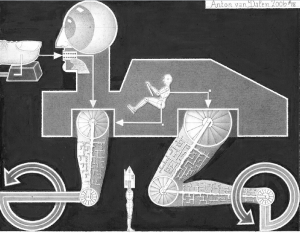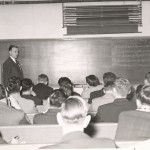 Have leisure and know that I am God. —Psalm 65:11
Have leisure and know that I am God. —Psalm 65:11
For a long time now I have tried to argue that the maintenance of my various social media accounts (Facebook, Twitter, Tumblr, etc.) should be considered work. After all, maintaining a social media presence—a phrase that makes the bile rise in my throat—is an easy and free way artists can gain a wide readership/viewership for their work.
But aside from the ill feeling I get after spending a whole morning liking, sharing, blogging, and re-blogging, I also feel a strange sense of disconnectedness from the work itself—the actual art that I’m making; in my case a book manuscript of a couple hundred pages.
I think the way I feel is what Marx calls alienation and estrangement from labor. Because my job is to be the producer, the marketing department, and salesman of the work, my time and attention are constantly divided. I would even go so far as to say my very habitus seems divided by the shifting of aesthetic gears it takes in order to be able to make my work sound relevant and interesting to others.
Josef Pieper in his important work Leisure—The Basis of Culture moves past the alienation and estrangement and worries that the laborer is increasingly “fettered to one’s work,” which leads to a kind of “inner impoverishment,” a spiritual poverty.
“His life has shrunk inwardly, and contracted, with the result that he can no longer act significantly outside his work, and perhaps can no longer even conceive of such a thing.”
I know this might sound melodramatic—I mean it’s just posting to Facebook, not working in a textile factory—but anyone who makes art for a living these days finds himself at this crossroads.
Art is my livelihood, the business by which I earn money, but it is also where I draw much spiritual sustenance and promoting it on the same platform that specializes in cute pet photos and political tirades seems to cheapen it. I just can’t help it. I grew up in the late 1980s and early ‘90s when the deep-seated fear for artists was not going hungry but selling-out.
And so for years I believed that becoming an artist would magically resolve any conflict between the two, but as I’ve gotten older and taken on more financial responsibilities, the tension has increased. I now tell my wife on a regular basis: “I’m ready to sell-out.”
To reconcile this tension I feel that I have to work harder, put in longer hours. In order to make up for the time I spend updating my Tumblr or Facebook page, I have to stay longer in the office writing. Either that, or after a long day of writing—which, given the amount of administrative work I have, rarely happens—I find myself standing at the kitchen counter minutes after arriving home trying to keep up the appearance (on social media, at least) that I am an interesting and productive writer.
This drives my wife crazy. She calls it an illness. She wonders aloud when I’m going to take a break. “When is it going to be summer?” she says. My reply is always that this, too, is part of being a writer these days.
But is it necessary? Is it actually a productive use of my time? I keep thinking to myself that if I could drop the social media aspect of my job I would have more leisure time; time to chill, as I might have said in high school.
Josef Pieper theorized that it is through entering into the sphere of leisure that we can begin to see rightly. Leisure “presupposes silence, a contemplative attention to things, in which man begins to see how worthy of veneration they are.”
In his definition, leisure is not meant as a restorative so that one has more energy for work, or so that one can perform faultlessly, but so that one has the time to contemplate and, as Pieper says:
Grasp the world as a whole and realize his full potentialities as an entity meant to reach wholeness…. The power to know leisure is the power to overstep the boundaries of the workaday world and reach out to super-human life-giving existential forces that refresh and renew us before we turn back to our daily work. Only in genuine leisure does the “gate to freedom” open.
One can escape the anxiety-inducing binary of work and unemployment, where, he writes, “work and unemployment are the two inescapable poles of existence.”
As I said before, in the beginning of my career, being an artist seemed to me a way out of that binary. I believed as Pieper does that the work of artists somehow “overstep the boundaries of the workaday.”
I want to believe this. I want very badly to not feel divided, to not feel that I am constantly at this crossroads, but to do that I need to find a way to treat art making more like work and less like some sort of shamanistic calling. To think of it this way is to make it precious: a rarified act that requires incense, green tea, ambient music, and meditation, rather than the sweat equity earned by putting your butt in the chair, turning off the Wi-Fi, and not getting up until you have a draft.
—Continued on Monday
David Griffith is the author of A Good War is Hard to Find: The Art of Violence in America (Soft Skull). He teaches creative writing at Sweet Briar College in Virginia where he lives with his wife Jessica Mesman Griffith and children, Charlotte and Alexander. His essays and reviews have appeared in Image, Utne Reader, The Normal School and online atkillingthebuddha.com. He blogs at Pyramid Scheme.














